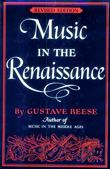Caccini, Giulio
Period: Renaissance
Born: Monday, October 8, 1551 in Tivoli, Italy
Died: Monday, December 10, 1618 in Florence, Italy
Nation of Origin: Italy
Major Works:
The opera Euridice
Operas, songs, and choral works
He is famous for Le nuove musiche (New Music) of 1602 which illustrated the new monodic style of the early Baroque with canzonets and madrigals. One of the songs included is Amarilli mia bella.
Other Information:
Caccini bridges the Renaissance and Baroque eras. His music represents an emphasis on monody (solo vocal music with harmonic accompaniment) instead of the Renaissance ideal of four equal voices in counterpoint. In addition to composing, Caccini was known as a singer, lutenist, and an excellent gardner. He worked in Florence for Cosimo I de' Medici around 1565. There he associated with a group of poets and musicians organized by Count Giovanni de Bardi (1534-1612) and the Italian nobleman Jacopo Corsi (1561-1602). This group is known as the Florentine Camerata. They met in the homes of aristocrats in Florence between 1573 and 1590. The chief products of this group were the first operas in music history and an expressive monodic style called stile rappresentativo.
General Bibliography:
Reese, Gustave, Music in the Renaissance, W.W. Norton & Company; November 1959, ISBN: 0393095304
Sachs, Curt, The Rise of Music in the Ancient World , W. W. Norton & Company, 1943, ASIN: 0393097188
Slonimsky, Nicolas and Kuhn, Laura; Editors, Baker's Biographical Dictionary of Musicians, Gale Group, December 2000, ISBN: 0028655257
Sadie, Stanley and Tyrrell, John; Editors, The New Grove Dictionary of Music and Musicians, Groves Dictionaries, Inc., January 2004, ISBN: 0195170679
Rutherford-Johnson, Tim, Kennedy, Michael, and Kennedy, Joyce The Oxford Dictionary of Music, Oxford University Press, 6th Edition, 2012, ISBN: 0199578109
Links to essays at other sites:
Please note: Each link will open in a new window.
Biographical essay from Wikipedia
